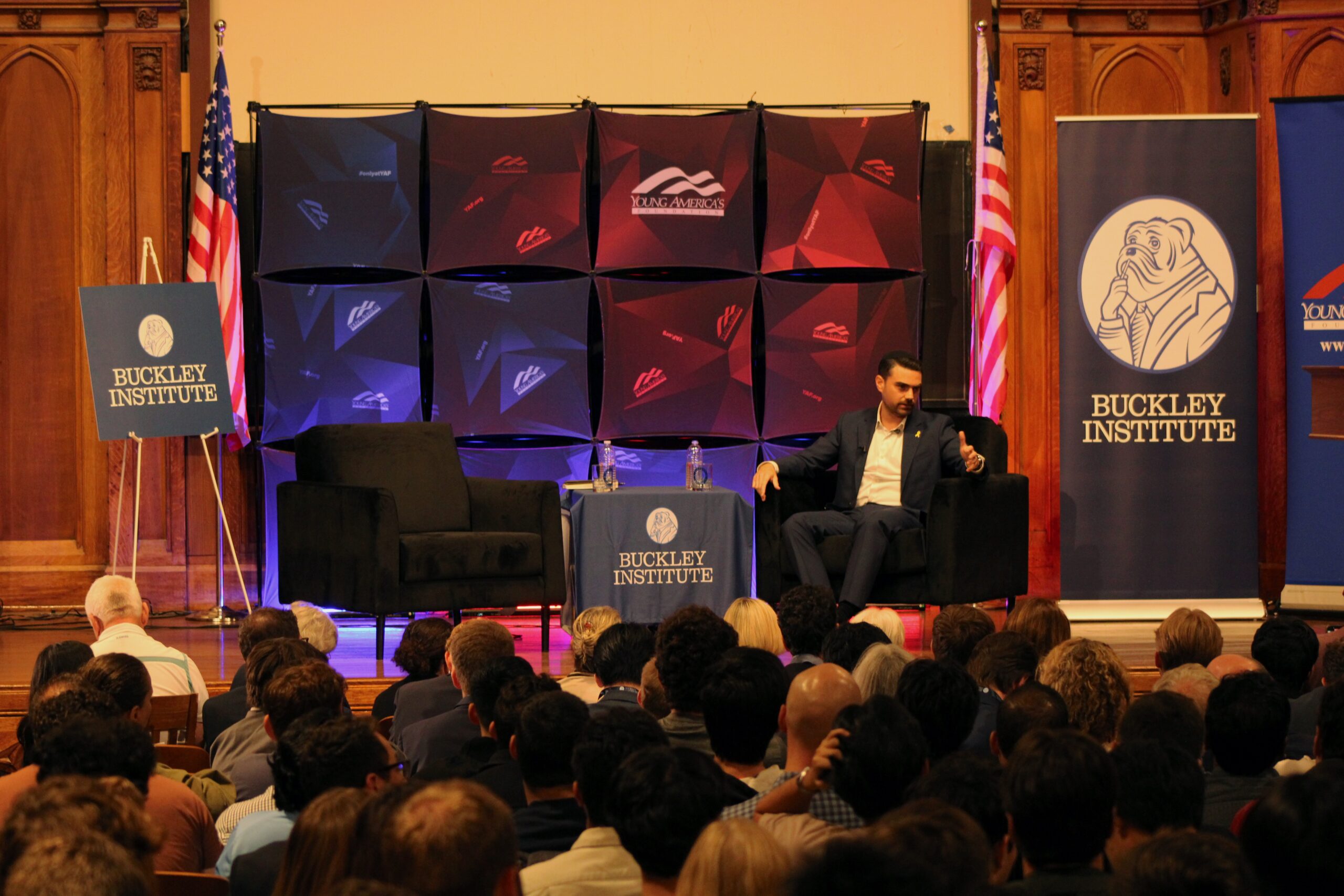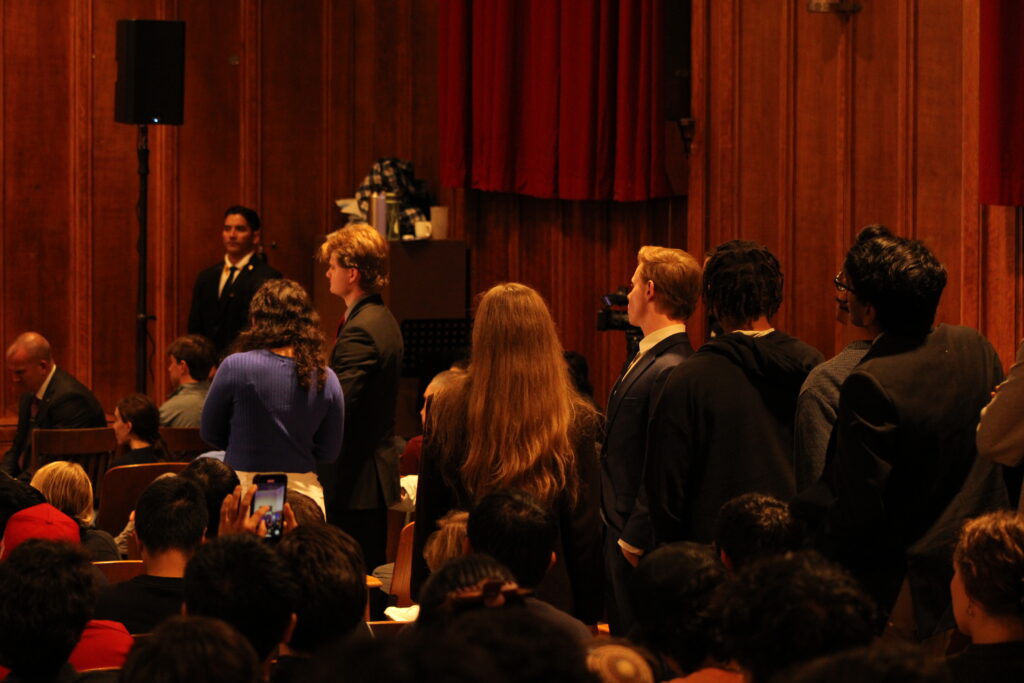Ben Shapiro talks campus protests at Oct. 7 Buckley event
Shapiro, a conservative political commentator known for expressing controversial views, was hosted by the Buckley Institute to speak at an event titled “How October 7 Broke America’s College Campuses.”

Samad Hakani, Photographer Editor
As groups across campus mourned the anniversary of the Oct. 7 terrorist attacks, Ben Shapiro spoke Monday night about campus reactions to the ongoing Israel-Hamas war at a Buckley Institute event.
The event, titled “How October 7 Broke America’s College Campuses,” was organized by the Buckley Institute, an organization that touts the advancement of “intellectual diversity and free speech at Yale.” The format of the event was a conversation between Shapiro and Buckley President Trevor MacKay ’25, followed by a Q&A with the audience.
Shapiro mainly spoke about the Israel-Hamas war at the event. Other topics discussed included abortion, racial politics and the war in Ukraine.
“I’ve been writing about this for a very long time, but the extent of the rot at the core of American education, I think, has been truly revealed over the course of last year,” Shapiro said.
Monday’s event was popular. Attendees filled the seats of SSS 114, a lecture hall which fits approximately 400 people. Even when the event reached capacity, around 1,000 people were still lined up outside Hillhouse Avenue and were unable to get seats. Some people stayed for around 10 to 20 minutes after the doors closed and watched the event’s livestream on their phones.
The event had heavy security. The News counted at least three police cars stationed outside and attendees were not able to bring bags and had to be cleared by a metal detector stick to enter the event. Shapiro himself entered the stage accompanied by multiple security guards.
Shapiro is known for his sharp responses to challenging questions from audience members at his speaker events, but was only confronted once during the Q&A period.

Zach Pan ’27 asked Shapiro about the choice of date, as Pan said he views scheduling the event at the same time as a vigil mourning those killed on Oct. 7 as “wrong.”
“As we stand here and talk today, students are holding a vigil to commemorate the people who died on Oct. 7 and this event is counterprogramming to that vigil. In fact, multiple student organizations wrote these letters asking you to hold this event at a different time,” Pan said. “Pirkei Avot tells us that you can serve God or you can serve yourself. You are being paid thousands of dollars to counterprogram a vigil for victims of Oct. 7. So my question to you is, how are you not serving yourself with this event?”
Pan referenced the portion of the Mishnah which discusses moral and ethical teachings of Judaism and the vigil co-hosted by the Joseph Slifka Center for Jewish Life and Chabad at Yale, which was occuring at the Women’s Table at the same time as Shapiro’s talk.
In response, Shapiro emphasized the independence of the different events.
“I don’t think that I’m serving myself, per se. I also don’t think that I need money,” Shapiro quipped. “So my suggestion would be that there are many ways to commemorate what happened. I don’t think that the folks who wish to hold different events have a veto on my event, and I certainly don’t have a veto on theirs.”
Shapiro also said that he had been invited to an event at Yale Chabad earlier in the evening so the idea that he was “ignoring the wishes of the entire Jewish community” was “insipid.”
“His response did not address the substance of the question. He’s quick on his feet, but he never answered why he’s counter-programming the vigil and dividing our campus on this day,” Pan told the News after the event.
In the first part of the event, two of MacKay’s questions focused on the mentality of Yale students protesting Israel’s actions in the Israel-Hamas war. Specifically, MacKay asked why students “want to blame Oct. 7 on Israel” and why they “go beyond normal rallies” to build living encampments.
To the first question, Shapiro said he feels there are “a few different groups that are complicit in this particular message” — one is “radical Muslims who believe that Israel ought to be wiped off.” The other, he said, is “American leftist college students” who believe “that success is inherently connected with exploitation.”
“The victim-victimizer narrative is the ugliest narrative in politics,” Shapiro further explained. “Because Israel is disproportionately powerful, because Israel is disproportionately successful, because Israel has actually built itself into a thriving democratic country, because of that, that anyone in the region is suffering, that must be a byproduct. It’s zero-sum thinking, and it isn’t true at all.”
Students at Yale began mobilizing in support of Palestinians just a few days after the Oct. 7 attacks and Israel’s immediate retaliation. Throughout October and November, student groups held rallies and events demanding a ceasefire in Gaza.
In the spring 2024 semester, protests intensified. Students, drawing on the war in Gaza, rallied for the University to divest from weapons manufacturers and set up two encampments on Beinecke Plaza and Cross Campus.
“I’m not a psychologist, you’d need a psychologist to examine why people would want to live in their own feces,” Shapiro said to audience laughter. “But, I think the sort of general, I think, push for it is presumably that you more dissociate from the civilization, that you are the beneficiary of, the more holy you are, the more virtuous you are.”
Students in the Yale encampments told the News last spring that they went into dorms and buildings to use the bathroom and shower.
An organizer of the protests last spring, who was granted anonymity out of safety concerns and fears of doxxing, wrote to the News that Shapiro’s characterization of the protests as “psychologically rooted” is “dishonest,” but “unsurprising” from Shapiro.
“The protests last spring were calling for an end to violence,” she wrote. “Everyone involved worked very hard to ensure that free expression remained peaceful and grounded in mutual concern for each others’ safety and of course for the safety of Palestinians living under daily bombardment.”
After the event, Pan noted that priority for tickets for the event went to Buckley fellows, which he felt meant the event “skewed conservative.”
MacKay wrote to the News that as with all of Buckley’s events, “the crowd more accurately reflected the political distribution of the United States” and was “a stark contrast with the strongly progressive culture on campus.”
Shapiro’s visit to Yale is part of a wider speaking tour with the Young America’s Foundation. After the Buckley event, he is scheduled to speak at the University of California, Los Angeles, Cornell University and Vanderbilt University.
The Buckley Institute was established as the William F. Buckley, Jr. Program in 2011.
Correction, Oct. 9: The article has been corrected to reflect that the vigil was co-hosted by the Joseph Slifka Center for Jewish Life and Chabad at Yale







